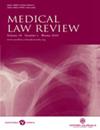欧盟对算法医疗的监管:通过《人工智能法案》(AI-Act)和责任指令演变医患模式。
IF 1.7
4区 医学
Q1 LAW
引用次数: 0
摘要
本文认为,人工智能(AI)与医疗保健的结合,尤其是根据欧盟的《人工智能法案》(AI-Act),对医患关系产生了重大影响。西方医学虽然历来是家长式的,但在技术进步的帮助下,现在强调在消费主义范式下的患者自主权。然而,全球医院采用人工智能的速度比以往更快,有可能重塑患者护理动态。这就出现了三种可能的途径:增强患者自主权、通过人工智能增强医生控制权,或者随着决策权转移到私人实体,双方都失去权力。本文认为,如果不解决《人工智能法案》基于风险的方法中存在的缺陷,私人实体可能会以牺牲患者自主权为代价获得权力。虽然《人工智能责任指令》(AILD)和修订后的《缺陷产品责任指令》(PLD)等拟议指令旨在降低风险,但它们可能无法解决《人工智能法案》的局限性。今后在解释新出现的监管架构时必须谨慎行事,以保护患者的自主权,并维护医疗保健专业人员在患者护理中的核心作用。本文章由计算机程序翻译,如有差异,请以英文原文为准。
Regulating algorithmic care in the European Union: evolving doctor-patient models through the Artificial Intelligence Act (AI-Act) and the liability directives.
This article argues that the integration of artificial intelligence (AI) into healthcare, particularly under the European Union's Artificial Intelligence Act (AI-Act), poses significant implications for the doctor-patient relationship. While historically paternalistic, Western medicine now emphasises patient autonomy within a consumeristic paradigm, aided by technological advancements. However, hospitals worldwide are adopting AI more rapidly than before, potentially reshaping patient care dynamics. Three potential pathways emerge: enhanced patient autonomy, increased doctor control via AI, or disempowerment of both parties as decision-making shifts to private entities. This article contends that without addressing flaws in the AI-Act's risk-based approach, private entities could be empowered at the expense of patient autonomy. While proposed directives like the AI Liability Directive (AILD) and the revised Directive on Liability for Defective Products (revised PLD) aim to mitigate risks, they may not address the limitations of the AI-Act. Caution must be exercised in the future interpretation of the emerging regulatory architecture to protect patient autonomy and to preserve the central role of healthcare professionals in the care of their patients.
求助全文
通过发布文献求助,成功后即可免费获取论文全文。
去求助
来源期刊

Medical Law Review
MEDICAL ETHICS-
CiteScore
3.10
自引率
11.80%
发文量
50
审稿时长
>12 weeks
期刊介绍:
The Medical Law Review is established as an authoritative source of reference for academics, lawyers, legal and medical practitioners, law students, and anyone interested in healthcare and the law.
The journal presents articles of international interest which provide thorough analyses and comment on the wide range of topical issues that are fundamental to this expanding area of law. In addition, commentary sections provide in depth explorations of topical aspects of the field.
 求助内容:
求助内容: 应助结果提醒方式:
应助结果提醒方式:


